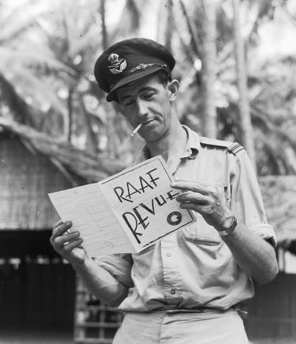
John William Pilbean Goffage MBE, known professionally as Chips Rafferty, was an Australian actor. Called "the living symbol of the typical Australian", Rafferty's career stretched from the late 1930s until he died in 1971, and during this time he performed regularly in major Australian feature films as well as appearing in British and American productions, including The Overlanders and The Sundowners. He appeared in commercials in Britain during the late 1950s, encouraging British emigration to Australia.

Ronald Grant Taylor was an English-Australian actor best known as the abrasive General Henderson in the Gerry Anderson science fiction series UFO and for his lead role in Forty Thousand Horsemen (1940).

Eureka Stockade is a 1949 British film of the story surrounding Irish-Australian rebel and politician Peter Lalor and the gold miners' rebellion of 1854 at the Eureka Stockade in Ballarat, Victoria, in the Australian Western genre.
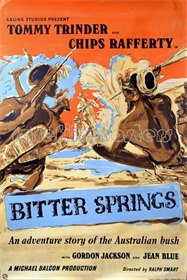
Bitter Springs is a 1950 Australian–British film directed by Ralph Smart. An Australian pioneer family leases a piece of land from the government in the Australian outback in 1900 and hires two inexperienced British men as drovers. Problems with local Aboriginal people arise over the possession of a waterhole. Much of the film was shot on location in the Flinders Ranges in South Australia
The Phantom Stockman is a 1953 Australian western film written and directed by Lee Robinson and starring Chips Rafferty, Victoria Shaw, Max Osbiston and Guy Doleman.

Walk Into Paradise is a 1956 French-Australian international co-production adventure film directed by Lee Robinson and Marcello Pagliero and starring Chips Rafferty and Françoise Christophe. It was shot on location in the highlands of Papua New Guinea.
Lee Robinson was an Australian producer, director and screenwriter who was Australia's most prolific filmmaker of the 1950s and part of the creative team that produced the late 1960s international hit television series Skippy the Bush Kangaroo.
Come Up Smiling is a 1939 Australian comedy film starring popular American stage comedian Will Mahoney and his wife Evie Hayes. It was the only feature from Cinesound Productions not directed by Ken G. Hall.

Bush Christmas is a 1947 Australian–British comedy film directed by Ralph Smart and starring Chips Rafferty. It was one of the first films from Children's Entertainment Films, later the Children's Film Foundation.
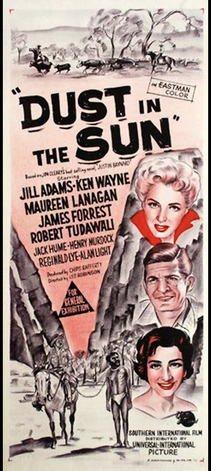
Dust in the Sun is a 1958 Eastmancolor Australian mystery film adapted from the 1955 novel Justin Bayard by Jon Cleary and produced by the team of Lee Robinson and Chips Rafferty. The film stars British actress Jill Adams, Ken Wayne and an Indigenous Australian actor Robert Tudawali as Emu Foot.
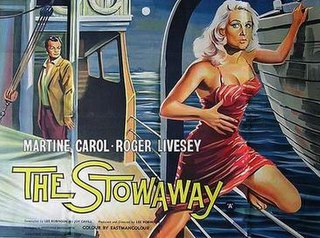
The Stowaway is a 1958 French-Australian film directed by Australian director Lee Robinson and French Lebanese director Ralph Habib. It was shot on location in Tahiti and is one of the few Australian financed movies of the 1950s, although the storyline has nothing to do with Australia.

Muriel Myee Steinbeck was an Australian actress who worked extensively in radio, theatre, television and film. She is best known for her performance as the wife of Sir Charles Kingsford Smith in Smithy (1946) and for playing the lead role in Autumn Affair (1958–59), Australia's first television serial.
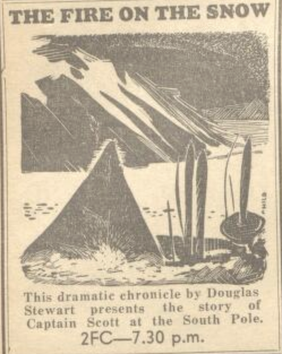
The Fire on the Snow is a 1941 Australian verse play by Douglas Stewart about the Terra Nova Expedition to Antarctica by Robert Falcon Scott. It premiered on ABC radio on 6 June 1941 to great acclaim and inspired a series of Australian verse dramas on ABC radio.
Anthony Scott Veitch was an Australian writer of radio, films, novels and TV. He worked for a number of years in British film and TV. His feature credits include The Kangaroo Kid (1950) and Coast of Skeletons (1964). He wrote more than 100 novels, including westerns and historical fiction.
The Crater is a 1948 Australian radio play by Sumner Locke Elliot that was later adapted for American television.
Red Sky at Morning is a 1935 Australian stage play by Dymphna Cusack. The play helped launch Cusack's writing career and was filmed in 1943.
The Harp in the South is a 1951 Australia radio serial adapted by Tony Scott Veitch from the novel of the same name by Ruth Park. It featured many leading actors of the time including Grant Taylor, Dinah Shearing and Reg Goldsworthy.
The Sundowner is an Australian radio series starring Chips Rafferty as a swagman.
The Prince of Peace is a 1950 Australian radio serial by Morris West about Jesus Christ. According to The Sun "each of the 39 episodes is self-contained, and the series presents a chronological story of Christ's life from His birth to. His resurrection. Each episode is told by an eye-witness — each a feasible character from one of the various social groups of polyglot Grneco-Roman Judea."
Ossie Wenban (1895–1978) was an Australian actor best known for his appearances in Cinesound's Dad Rudd films starring Bert Bailey.










